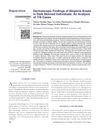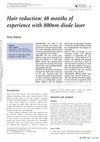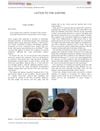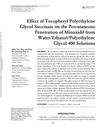 25 citations,
May 2003 in “Expert Opinion on Therapeutic Patents”
25 citations,
May 2003 in “Expert Opinion on Therapeutic Patents” Steroid Sulfatase inhibitors show promise in treating hormone-dependent disorders like cancers, hair loss, and acne, with 667COUMATE being a potential candidate for breast cancer treatment trials.
24 citations,
September 2020 in “Pharmaceutics” Lidocaine-loaded microparticles effectively relieve pain and fight bacteria in wounds.
 21 citations,
January 2014 in “International Journal of Trichology”
21 citations,
January 2014 in “International Journal of Trichology” The study concluded that yellow dots are a common and useful sign for diagnosing alopecia areata in dark-skinned individuals and may indicate the severity of the condition.
 20 citations,
October 2008 in “Archives of dermatological research”
20 citations,
October 2008 in “Archives of dermatological research” Angiogenin helps hair grow by stimulating cell growth and blood vessel formation.
 20 citations,
December 2003 in “Journal of Cosmetic and Laser Therapy”
20 citations,
December 2003 in “Journal of Cosmetic and Laser Therapy” An 800nm diode laser safely and effectively reduces hair for about 8 months, with most patients satisfied and few side effects.
 19 citations,
June 2011 in “British Journal of Dermatology”
19 citations,
June 2011 in “British Journal of Dermatology” Severe digestive issues in DRESS need early endoscopy for better treatment.
19 citations,
July 2004 in “Clinical and experimental dermatology” Acneiform follicular mucinosis can be controlled with systemic corticosteroids.
 18 citations,
January 2020 in “Journal of the European Academy of Dermatology and Venereology”
18 citations,
January 2020 in “Journal of the European Academy of Dermatology and Venereology” High-potency steroids or tacrolimus are effective treatments for Erosive Pustular Dermatosis of the Scalp.
18 citations,
June 2001 in “Journal of Investigative Dermatology” Adding a specific gene to skin cells can help treat skin disorders like psoriasis.
18 citations,
November 1998 in “Comparative biochemistry and physiology. Part A, Molecular & integrative physiology” Changes in prolactin and DHEA levels are not required for the start of mink hair growth cycles.
 17 citations,
October 2003 in “Brazilian Journal of Medical and Biological Research”
17 citations,
October 2003 in “Brazilian Journal of Medical and Biological Research” The gene SDR5A1 is found in scalp hair of both hirsute and normal individuals, but it does not explain differences in hair growth.
 16 citations,
March 2018 in “Seminars in Oncology”
16 citations,
March 2018 in “Seminars in Oncology” The document concludes that pregnancy and cancer share immune evasion tactics, but more research is needed before using checkpoint blockade immunotherapy in pregnant cancer patients to avoid harm to the placenta.
16 citations,
January 2000 in “Journal of dermatological treatment” Calcipotriol scalp solution works better than coal tar shampoo for treating scalp psoriasis and is safe for long-term use.
 16 citations,
October 1994 in “The Journal of Steroid Biochemistry and Molecular Biology”
16 citations,
October 1994 in “The Journal of Steroid Biochemistry and Molecular Biology” Two non-steroidal antiandrogens, RU 58841 and RU 56187, form a common metabolite at different rates, which may influence their effects; RU 56187 could be used for prostate cancer treatment and RU 58841 for acne treatment.
 16 citations,
January 1987 in “Dermatology”
16 citations,
January 1987 in “Dermatology” The spironolactone cream did not reduce hair growth in women with hirsutism.
 14 citations,
February 2020 in “Scientific reports”
14 citations,
February 2020 in “Scientific reports” Telocytes in the scalp may help with skin regeneration and maintenance.
 14 citations,
June 2019 in “BMC infectious diseases”
14 citations,
June 2019 in “BMC infectious diseases” A rare fungal infection on a child's scalp was successfully treated with antifungal medication.
14 citations,
August 2014 in “Journal of the American Academy of Dermatology” Diphenylcyclopropenone (DPCP) is effective in treating alopecia areata, with most patients showing significant hair regrowth.
 14 citations,
May 2013 in “Emerging infectious diseases”
14 citations,
May 2013 in “Emerging infectious diseases” Cryptococcus gattii can remain dormant in animals for over 8 years.
 13 citations,
October 2019 in “Journal of lasers in medical sciences”
13 citations,
October 2019 in “Journal of lasers in medical sciences” CO2 laser treatment for aging skin significantly changes immune system-related genes.
 13 citations,
December 2018 in “Development, Growth & Differentiation”
13 citations,
December 2018 in “Development, Growth & Differentiation” Sex hormones, especially estradiol, can change chicken feather shapes and colors.
 13 citations,
May 1993 in “International Journal of Dermatology”
13 citations,
May 1993 in “International Journal of Dermatology” The paper suggests that telogen effluvium, a type of hair loss, may be a long-lasting condition triggered by stress or illness in people whose hair growth is unusually synchronized.
 13 citations,
January 1991 in “Dermatology”
13 citations,
January 1991 in “Dermatology” Minoxidil helps hair growth in people with monilethrix without side effects.
 12 citations,
March 2018 in “Australasian Journal of Dermatology”
12 citations,
March 2018 in “Australasian Journal of Dermatology” Minoxidil treatment can reduce hair shedding, increase hair volume, and even change hair color in patients with loose anagen hair syndrome.
 11 citations,
May 2011 in “Journal of Cutaneous Medicine and Surgery”
11 citations,
May 2011 in “Journal of Cutaneous Medicine and Surgery” Break dancing on the head may cause a type of scarring hair loss that needs early treatment to prevent permanent damage.
 11 citations,
February 2008 in “British journal of nursing”
11 citations,
February 2008 in “British journal of nursing” Idiopathic hirsutism causes excessive hair growth in women, can be treated with medication and hair removal, but cannot be fully reversed.
 11 citations,
January 2006 in “Drug development and industrial pharmacy”
11 citations,
January 2006 in “Drug development and industrial pharmacy” Adding TPGS to minoxidil solutions can improve skin penetration and retention, especially in water and PEG 400-based solutions.
 11 citations,
August 2000 in “Journal of Endocrinology”
11 citations,
August 2000 in “Journal of Endocrinology” DHEA acts like a male hormone on rat skin glands and doesn't turn into female hormones there.
 11 citations,
January 1985 in “Archives of Dermatology”
11 citations,
January 1985 in “Archives of Dermatology” Topical antiandrogens might treat skin issues like hair growth, balding, and acne, but finding effective treatments without side effects is challenging.
 10 citations,
November 2018 in “Nature Biotechnology”
10 citations,
November 2018 in “Nature Biotechnology” Drugmakers are optimistic about targeting the Wnt pathway for new treatments despite past challenges.























